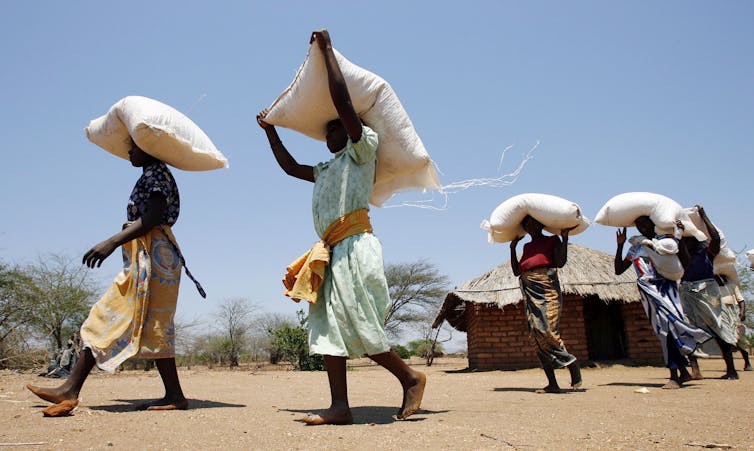African countries’ policies must shift to achieve zero hunger
By: Sheryl L Hendriks, University of Pretoria; Elizabeth Mkandawire, University of Pretoria, and Nosipho Mabuza, University of Pretoria

Jon Hrusa/EPA
For the third year in a row hunger is rising across the world. And, as a recent report by the United Nations’ Food and Agriculture Organisation shows, the situation is worsening in most regions in Africa. Almost 21% of the continent’s population of 1,216 billion is undernourished.
Many factors drive this trend. Among these are rising population growth, conflict and poor governance. Severe weather conditions and climate change also play a role. This leads to food insecurity: a state of deprivation ranging from starvation through severe and constant hunger to deficiencies in vitamins and minerals. It’s rooted in poverty and inequalities that deprive people of the right to adequate food to meet their needs.
We reviewed whether the food security plans of 10 countries were aligned with the African Union’s Malabo Biennial Review technical guidelines (which is related to agriculture and food security), the continent’s Agenda 2063 and the Sustainable Development Goal targets. The ten countries were Benin, Burkina Faso, Cote d’Ivoire, Guinea, Guinea Bissau, Liberia, Malawi, Niger, Nigeria and Togo.
We found that the plans were generally compliant with the Sustainable Development Goal indicators directly related to agriculture and food security. However, they were not as closely aligned to Africa’s Agenda 2063 and the Malabo commitments. They generally missed the opportunity to advance agricultural transformation to reduce poverty, inequality and unemployment.
Countries could benefit from more closely aligning these plans with their national visions, policies and strategies. A greater focus on core development goals could reduce competition for budget resources.
The plans can be strengthened and better aligned. This would offer opportunities to streamline monitoring and reporting on international, continental and national policies. It could also reduce the need for parallel reporting systems.
The African Union needs to provide clearer guidance and active oversight on these matters. The teams responsible for drafting countries’ plans related to food and agricultural investment should be regularly trained and their skills updated.
A lack of coordination
In 2014, most African governments signed the Malabo Declaration on Accelerated Agricultural Growth and Transformation for Shared Prosperity and Improved Livelihood. This reiterated commitments made in Mozambique more than a decade earlier, and in the continent’s Agenda 2063.
Once the declaration was signed, governments were expected to design and implement agriculture and food security investment plans. These are five-year integrated development strategies. They set out key priority programmes to achieve the Malabo Declaration’s goals related to advancing agricultural growth, improving food security and reducing malnutrition.
For example, when it comes to food security the plans need to prioritise crops that can increase household incomes. They must also make food more affordable and smooth the seasonal availability of nutritious foods. Through the plans and programmes, governments must directly increase people’s dietary diversity.
It’s one thing to come up with these plans. But implementing the programmes is tough. Integrated programmes require coordination and collaboration across multiple ministries. They involve the participation of a range of stakeholders with differing priorities. Yet, very few professionals are trained to work across disciplines. Also, budgets and performance management systems are typically associated with these siloed units. This makes collaboration tricky.
It’s important for African governments to align their plans with the UN’s Sustainable Development Goals, Agenda 2063 and their own national development plans. Doing so improves the coherence and efficiency of planning. It saves resources, the costs of data collection and makes for a coherent system.
But African governments just aren’t doing this, as our research shows.
We found that, based on their plans, most countries didn’t understand what food security really means. They focused their actions and indicators narrowly on agricultural production and support services. This suggests that ministries are still working in silos rather than embracing a multisectoral approach to integrated planning.
Several countries including Angola, Cameroon, Ethiopia, Ghana, Rwanda, Senegal and Togo, have shown that coordinated effort can achieve real gains in dealing with hunger and related issues. Integration is crucial if these gains are to be replicated elsewhere on the continent.
Better indicators
Of course, increases in agricultural production – which featured prominently among most countries’ indicators – are necessary for achieving food security. But they’re not enough.
A comprehensive food security strategy needs to address the four dimensions of food insecurity. These are the availability of food, access to food (such as social protection programmes), nutrition and the resilience of food systems. These elements were largely missing from the plans.
Indicators related to social inclusion were also often absent despite instability, conflict and migration being significant challenges for agricultural growth and food security in Africa.
Similarly, despite the high levels of corruption in Africa, none of these countries included indicators for managing and mitigating corruption.
Training and planning
Our research suggests that countries in Africa should think more deeply about how to align their National Agriculture and Food Security Investment Plans with other relevant frameworks.
This will require a greater consciousness at all levels of African governments about what commitments have been made on various international and continental platforms. The teams responsible for drafting these plans should be trained with alignment in mind – with a good understanding of what other frameworks matter.![]()
Sheryl L Hendriks, Professor in Food Security; Director, Institute for Food, Nutrition and Well-being, University of Pretoria; Elizabeth Mkandawire, Research Assistant, University of Pretoria, and Nosipho Mabuza, Research Assistant, University of Pretoria, University of Pretoria
This article is republished from The Conversation under a Creative Commons license. Read the original article.
Written by: Natasha
Similar posts
MORE ARTICLES
QUICK LINKS
UpComing Shows

The Hive
With Bonolo "Bee Sting" Molosiwa
Every "Hive" needs a Queen B and Bonolo "Bee Sting" Molosiwa is Kaya 959's honey who brings in the money. With her bubbly personality, infectious laugh, Bee Sting radiates positive energy which is all you need to get your weekend off to the best start. Don't miss the Afrobeat Dancehall Ragga (ADR) Top 10 on The Hive with Bee Sting every Saturday from 18h00 - 21h00.
close
Tune and Chill
with Tyroline Franks
Tune and Chill with Tyroline Franks on Kaya 959. Weekends, Saturday and Sunday, 15pm-18pm.
close
On the Beat
On the Beat with George Manyosi on Kaya 959. Saturday's, 18pm-21pm.
close
Touch of Soul
With T Bose
Kaya 959 takes back Sundays with A Touch of Soul, the only show bringing you soul and RnB music that touches your mind, body and spirit. The Best T in the City, T-bose takes you back to a time when music was made to last. A Touch of Soul is the perfect wind-down to your weekend. Sundays 14h00 to 18h00.
close
The Jazz Standard
with Brenda Sisane
The Jazz Standard with Brenda Sisane. Sunday's 12:00-15:00.
close
Spade of Hearts
With Xola Dlwati
WITH XOLA DLWATI: SATURDAYS 12:00 -15:00 Spade of Hearts is a fuse of love and soulful sounds, pulling at your heartstrings. Tune in for songs that will take you down memory lane. It is the sound that once dominated your playlist. It airs Sundays 12:00 – 15:00.
closeConnect with Kaya 959
DownLoad Our Mobile App
© 2024 Kaya 959 | On The Street On The Air














